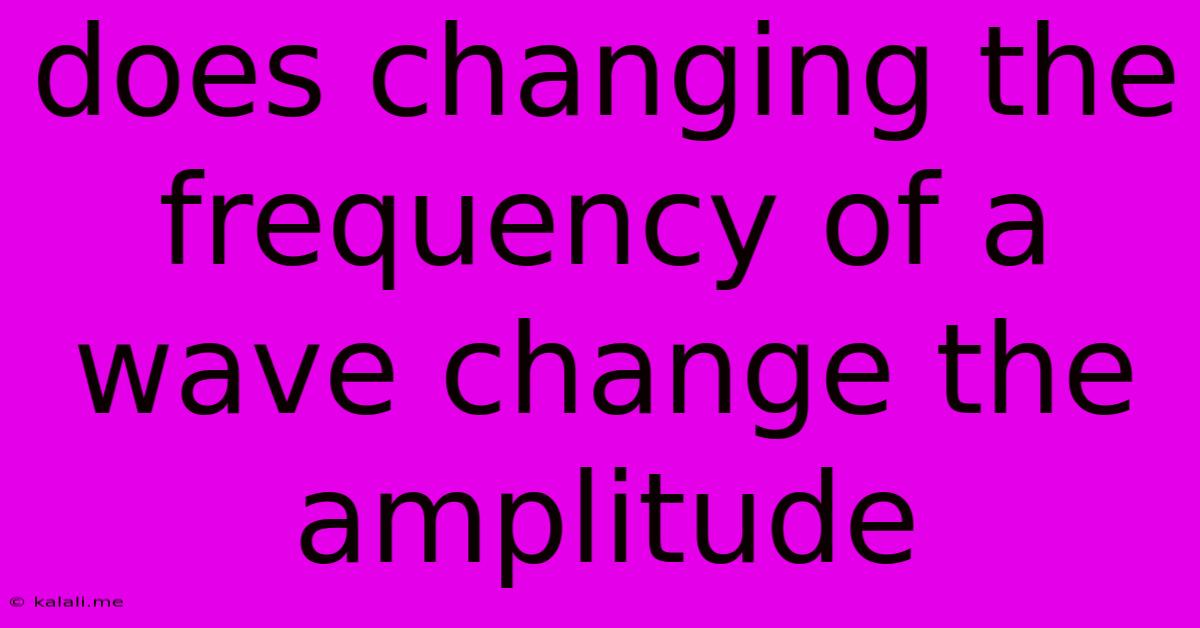Does Changing The Frequency Of A Wave Change The Amplitude
Kalali
Jun 01, 2025 · 3 min read

Table of Contents
Does Changing the Frequency of a Wave Change the Amplitude?
Meta Description: Understanding the relationship between frequency and amplitude in waves is crucial in physics. This article explores whether altering a wave's frequency affects its amplitude, clarifying the misconception and explaining the underlying principles.
The simple answer is: no, changing the frequency of a wave does not inherently change its amplitude. Frequency and amplitude are independent properties of a wave. This means you can adjust one without directly affecting the other. Let's delve deeper into why this is the case and explore some related concepts.
Understanding Wave Properties
Before we address the core question, let's define key wave characteristics:
-
Frequency: This refers to the number of complete wave cycles that pass a given point per unit of time. It's typically measured in Hertz (Hz), representing cycles per second. A higher frequency means more cycles per second, resulting in a shorter wavelength.
-
Amplitude: This represents the maximum displacement of a wave from its equilibrium position. For example, in a sound wave, it corresponds to the loudness; in a light wave, it relates to the brightness. A higher amplitude signifies a more intense wave.
-
Wavelength: The distance between two consecutive corresponding points on a wave (e.g., two crests or two troughs). Wavelength is inversely proportional to frequency; higher frequency means shorter wavelength, and vice-versa.
The Independence of Frequency and Amplitude
Imagine a simple sine wave. You can easily visualize increasing or decreasing its frequency (making the wave more or less compressed horizontally) without altering its height (amplitude). Similarly, you can increase the wave's height (amplitude) without changing how many cycles pass a point in a given time (frequency). These two properties are distinct and can be modified independently.
Cases Where Changes Might Seem Related
While frequency and amplitude are independent, certain scenarios might create the illusion of a relationship. For instance:
-
Energy Transfer and Damping: In some systems, like a damped harmonic oscillator, the amplitude of the wave might decrease over time as energy is lost. This decrease in amplitude might correlate with the frequency, but it's not a direct causal relationship. The decrease is due to energy dissipation, not the frequency itself.
-
Nonlinear Systems: In nonlinear systems, the relationship between frequency and amplitude can become complex. Certain phenomena, like harmonic generation, can produce waves with different frequencies and amplitudes that are related. However, this is a consequence of the nonlinearity, not a fundamental property of waves.
-
Signal Processing and Filtering: When manipulating waves using filters, certain frequencies might be attenuated (reduced in amplitude) more than others. However, this is an external manipulation; the inherent properties of the original wave aren't changed.
Conclusion
In conclusion, altering the frequency of a wave does not directly change its amplitude. These two properties are independent characteristics. While certain situations might appear to show a relationship, a closer examination reveals that the apparent correlation often stems from external factors like energy loss or nonlinear effects, not a direct causal link between frequency and amplitude. Understanding this distinction is fundamental to comprehending wave behavior in various physical systems.
Latest Posts
Latest Posts
-
Can You Use T8 Bulbs In T12 Fixtures
Jun 03, 2025
-
How Long To Let Car Cool Down Before Adding Coolant
Jun 03, 2025
-
Air Is Less Dense Than Water Because
Jun 03, 2025
-
I Recently Lost Work Due To Letter Of Resignation
Jun 03, 2025
-
Ac Unit Struggling To Keep Up
Jun 03, 2025
Related Post
Thank you for visiting our website which covers about Does Changing The Frequency Of A Wave Change The Amplitude . We hope the information provided has been useful to you. Feel free to contact us if you have any questions or need further assistance. See you next time and don't miss to bookmark.